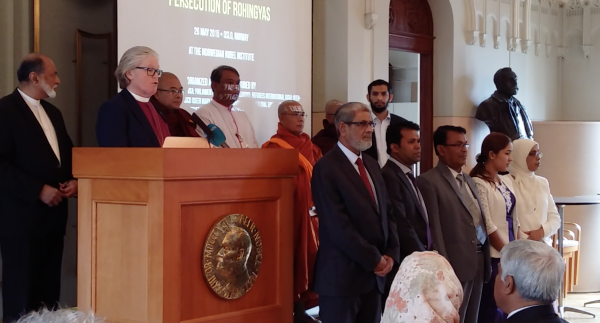Some of the world’s most influential voices on Burma participated in an urgently organised conference on Southeast Asia’s Rohingya migrant crisis in Oslo, Norway, on Tuesday.
South African Archbishop Desmond Tutu, UN Special Rapporteur to Burma Prof. Yanghee Lee and Malaysia’s former prime minister, Dr Mahathir Mohammad, were among those who took part in the ‘Oslo conference to end Myanmar’s persecution of Rohingya since 1976’, which was held at the Norwegian Institute and Vorksenaasan Conference Centre.
The recent influx of migrants into Thailand, Indonesia and Malaysia who had been abandoned at sea following a Thai crackdown on trafficking has led to increased international attention on the situation of the Rohingya in recent weeks. The International Organization for Migration said that over 3,600 people had disembarked in Malaysia, Indonesia, Thailand and Bangladesh since the beginning of the crisis.
Describing the plight of the Rohingya as “one of the most enduring human rights crises on earth,” Desmond Tutu told the conference via video link that: “The Rohingya people were not consulted when the British drew the Burmese border on the map. With those strokes of a pen, they became a borderland people; people whose ancestral land traverses political boundaries,” adding that the Rohingya had been recognised under the post-colonial elected government of 1948*, and the military government from 1962 to 1974.
“As lovers of peace and believers in the right of all members of the family to dignity and security, we have particular responsibilities to the Rohingya,” he said.
Tutu told attendees that aid- and grant-making bodies, “including the European Union,” should be persuaded to make development assistance contingent on “the restoration of citizenship, nationality and basic human rights to the Rohingya.”
Noting that: “2015 is a big year for Myanmar [Burma] with both a referendum on its constitution and a general election on its calendar,” Tutu said that investors in Burma are also subject to obligation.
[related]
“We have a responsibility to hold to account those of our governments and corporations that seek to profit from new relationships with Myanmar to ensure their relationships are established on sound ethical basis,” he said.
The three-day event’s backers include the Oxford University Poverty and Human Development Initiative (OPHI), the Harvard University Global Equality Initiative, and the Parliament of the World’s Religions.
Former Malaysian Prime Minister Mahathir Mohammad compared the exclusion of Rohingya by Burma to the exclusion of Burma from the Association of South East Asian Nations, saying “Its exclusion would be contrary to the idea of Southeast Asian unity. But now, we find that Myanmar is not treating its own people the way we treat Myanmar.”
On the issue of citizenship for the Rohingya, he said that: “They have always been regarded as citizens of Burma before, and since Myanmar is a continuation of Burma, it should accept these people as its citizens.”
Decrying the lack of support for Rohingya from key figures in Burma, Mahathir told the conference in a pre-recorded message that he “had expected that those who benefited from our struggle to get Myanmar to release, for example, Aung San Suu Kyi – that they would realise that oppression by the government is something that is intolerable; and yet few people from Myanmar have risen to the occasion to defend the rights of the Rohingyas who, after all, are citizens of Myanmar.”
Acclaimed peace activist Mairead Maguire told the conference: “The plight of the Rohingyas in Myanmar has worsened since 2012. Right now they feel they have two equally risky options – to stay and die in Myanmar or leave by boat.
“The international community needs to support the delivery of basic humanitarian aid to the Rohingyas. Right now, that humanitarian aid is not reaching them,” she said.
An inter-faith group of religious leaders including Burmese Buddhist monks, Burmese Christian leaders, Parliament of Religions Chair Imam and Doctor Malik Mujahid, and the Bishop Tor B. Jorgensen of Norway opened the session with a prayer for peace.
The second and third days of the conference will see roundtable discussions and strategic planning between representatives of rights groups, Rohingya leaders and religious figures on issues of rights and citizenship of Rohingya in Burma.
*This article has been edited to clarify that Archbishop Desmond Tutu referred to the post-colonial elected government of 1948, and not the British colonial government of 1948 as previously stated.



